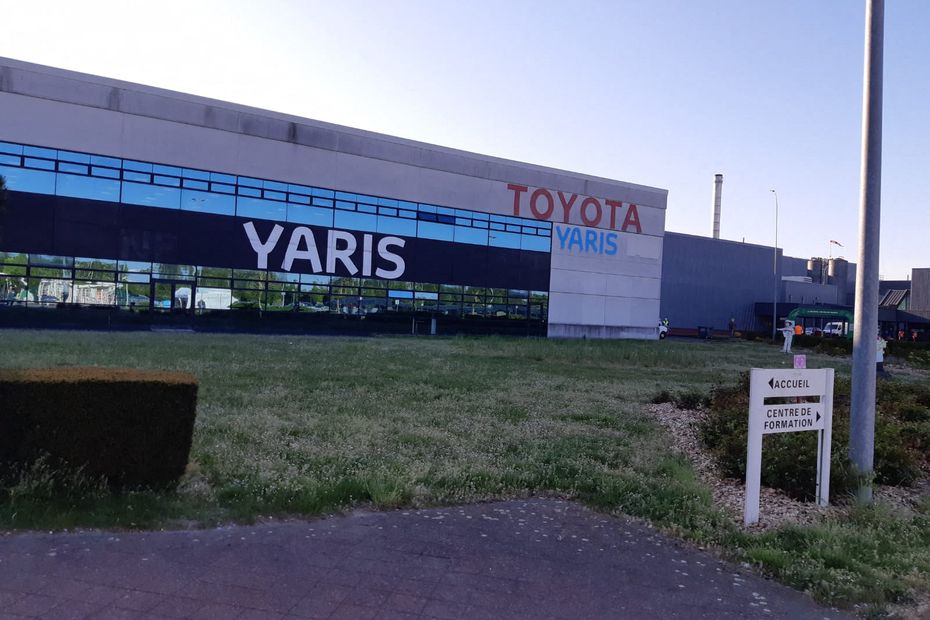The Toyota plant in Onnaing, near Valenciennes, is closed on Monday April 12 for two days. The cause is delivery delays and supply problems for semiconductors such as electronic components.
–
The Toyota plant is at a standstill. The Onnaing site, near Valenciennes (North), did not open this Monday, April 12. This will also be the case on Tuesday. This is due to the global shortage of semiconductors such as electronic chips, essential for the manufacture of gasoline vehicles (20% of the plant’s production) as well as hybrids (80%). “A structural problem”, comments Eric Moyère, administrative and financial director of Toyota Motor Manufacturing France, reached by phone.
Manufacturers of electronic components have faced a sudden surge in demand for equipping electronic products. Computers or game consoles have been in high demand in the context of the Covid-19 pandemic, which has accelerated the rise of telecommuting and home entertainment. However, the semiconductor market was already under pressure due to the trade war between the United States and China. The main manufacturers are located in Taiwan (TSMC) and South Korea (Samsung and SK Hynix).
The northern plant, which has some 3,950 employees, had already had to close on April 6 for the same reasons. “We anticipated a drop in production volume and made this closure coincide with the new school calendar linked to the health crisis”, Eric Moyère is justified, worried in the face of a shortage that does not seem to be going away. “We had to revise our production plan for the month of April, but unfortunately, it will not be resolved overnight. We are not immune to a new shutdown.” The blockade of the Suez Canal for several days in March also caused delivery delays for Toyota.. “Parts coming from Japan and passing through the port of Rotterdam”, continues Mr. Moyère.
Reached by phone, Eric Pecqueur, CGT secretary general of Toyota, especially denounces the dependence on the foreign market. “Much of the capitalist economy operates on a just-in-time basis. As soon as there is a grain of sand, it disrupts the entire world economy, capitalism seizes up, and it is we, the workers, who pay. . We denounce the anarchy of capitalism. “
Modulation of working time
As in December 2020, when the plant had closed for a week after the termination of links between France and the United Kingdom, modulation of working time was used. This device, which makes it possible to adapt working hours according to variations in the activity of a company, is denounced by certain unions such as the CGT. “We denounce the scam of this employer modulation of working time. These are two new days lost for temporary workers, fixed-term contracts at the end of their contract will be withdrawn these two days from their total pay and we will have to make up for these days of weekend production “, defends Eric Pecqueur, worker in the assembly workshop.
Management argues that employees are paid these two days, despite the closure, and that the catch-ups that will take place on Saturday (40% of a typical day according to Eric Moyère) and Sunday (100%) are compensations, like bonus. “A Saturday worked with a premium is paid 8 hours and 45 minutes instead of 7 hours and a Sunday is paid 2 hours …”, Mr. Pecqueur advances.
It remains to be seen when these three days – April 6, 12 and 13 – will be made up for. “For the moment, we have no visibility”, explains Eric Moyère. If the shortage of electronic components continues, the site may well be shut down again. Discussions could then take place between management and the unions. “In the modulation agreement, the cap is set at 50 hours.” Little room for maneuver for management.
What is a semiconductor?
Semiconductors are materials (one of the best known is silicon) and by extension, the electronic components made with them: for example chips allowing devices to capture, process or store data.
These components are essential to entire sections of the global industry and integrated into many everyday objects. It is found in electronic or connected devices such as smartphones, computers or video game consoles, automobiles (especially dashboards), airplanes, computer or telephone networks …
They are usually tiny. “The most advanced components are between 5 and 7 nanometers”, Jean-Christophe Eloy, CEO of Yole Développement, specializing in semiconductors, told AFP.
–

:quality(80)/cdn-kiosk-api.telegraaf.nl/c13c4472-9ad2-11eb-b703-0218eaf05005.jpg)
